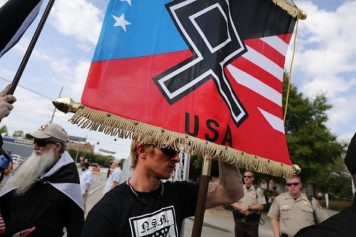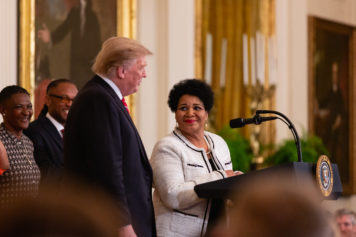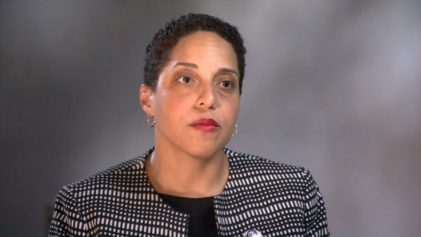According to a new poll, white Americans yearn for the 1950s, the good old days when they did not face so much racial discrimination as they do now. Of the bat, this sounds like a satire piece from The Onion, except sadly, it is very true.
According to the survey, released by Public Religion Research Institute (PRRI) this week, over four in ten Americans (43 percent) say that anti-white discrimination has become as much of a problem as discrimination against Black people and other minorities, with 55 percent disagreeing. PPRI notes that opinions regarding so-called “reverse discrimination” have remained constant over the past few years. Half (50%) of whites, including 60 percent of working-class whites agree that discrimination against whites is serious, in contrast to 29 percent of Latinos and 25 percent of African-Americans.
Also related to these findings, a majority of Americans (53 percent) say that the American culture and way of life has changed for the worse since the 1950s, as opposed to 46 percent who say things have gotten better. In contrast, 60 percent of Blacks and 54 percent of Latinos believe the situation in the U.S. has improved, as opposed to 42 percent of whites. Unpacking the numbers a little more, 57 percent of whites say America has worsened over the past sixty years, as well as a majority of independents (56 percent), Republicans (67 percent), and Tea Party members (72 percent), but only 40 percent of Democrats.
The 1950s, lest we need to remind ourselves, marked the beginning of the Civil Rights Movement. In 1954, the U.S. Supreme Court issued its decision in Brown v. Board of Education, which overturned Jim Crow racial segregation in the public schools. These were the days when white privilege was normalized and white supremacy went unchallenged, and Black people were rendered invisible, unless they were preparing a meal for a white family or dangling from a tree. Whites controlled the whole game back then, as they still do to a great extent, with the difference that today, Black and Brown people are asserting themselves and demanding their rights, as conservatives turn back the clock and roll back those nominal gains we made with the Civil Rights legislation of the 1960s.
In addition, America is browning and blackening, with so-called racial minorities already constituting a majority of babies born, and a majority of public school students. It is only a matter of time when whites will constitute a numerical minority, creating a psychic breakdown for some. After controlling the whole pie since the founding of this nation, the thought of now sharing the pie–with those who will no longer sit in the back of the bus—leads to cries of reverse discrimination among large sectors of white America.
Some of the other findings of the poll regarding race, policing and the criminal justice system are revealing as well. A majority—53 percent—say that the recent killings of Black men by law enforcement are isolated incidents, while 44 percent believe they are a broader pattern of how police treat Black people. The breakdown by race is revealing, as an overwhelming two-thirds (65 percent) of whites say such incidents are isolated, while 41 percent of Latinos and a mere 15 percent of Blacks agree. 81 percent of African-Americans say the recent killings of African-American men point to a larger problem.
Further, among religious groups, white Christians are more likely than others to say the police killings of Black men are isolated, including over seven in ten white evangelical Protestants (72 percent), white mainline Protestants (73 percent), and white Catholics (71 percent). On the other hand, 62 percent of Americans who are members of non-Christian religions, and 59 percent of those who are religiously unaffiliated Americans believe that these killings are part of a broader pattern. Among Black Protestants, 82 percent say there is a broader pattern at play.
Meanwhile, looking at the criminal justice system, nearly six in ten people (58 percent) disagree that Blacks and other minorities are treated equally, up from 47 percent in 2013. In addition, 85 percent of Blacks and 67 percent of Latinos disagree that people of color receive equal treatment in the criminal justice system. White Americans are divided on the issue, with 52 percent in disagreement, and 47 percent in agreement. However, whites with a college education (64 percent) are substantially more likely than members of the white working class (47 percent) to disagree that minorities receive equal treatment in the justice system.
And finally, on the issue of racism and implementation of the death penalty Americans are closely divided. A majority of Americans–53 percent—say that a Black person is more likely to receive a death sentence for the same crime than a white person, with 45 percent disagreeing. While 82 percent of Blacks and 59 percent of Latinos believe a Black person is more likely to receive the death penalty than a white person for the same crime, fewer than half of whites (45 percent) agree.
If this is what the racial justice landscape looks like for the twenty-first century, it is no wonder the #BlackLivesMatter movement is necessary. White America needs to wake up, and Black America, we need to #StayWoke.



